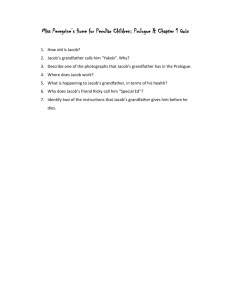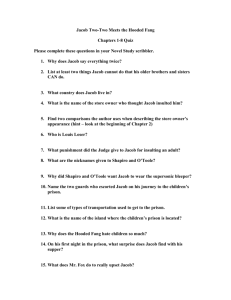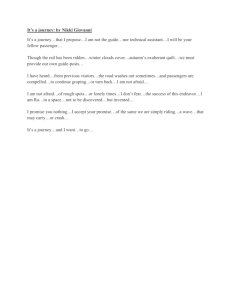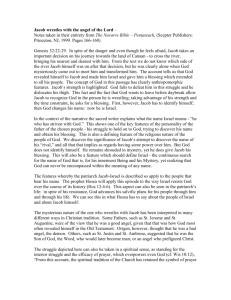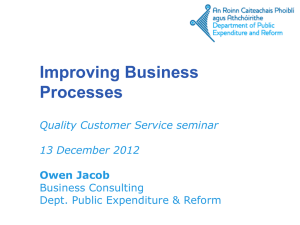Session 6
advertisement
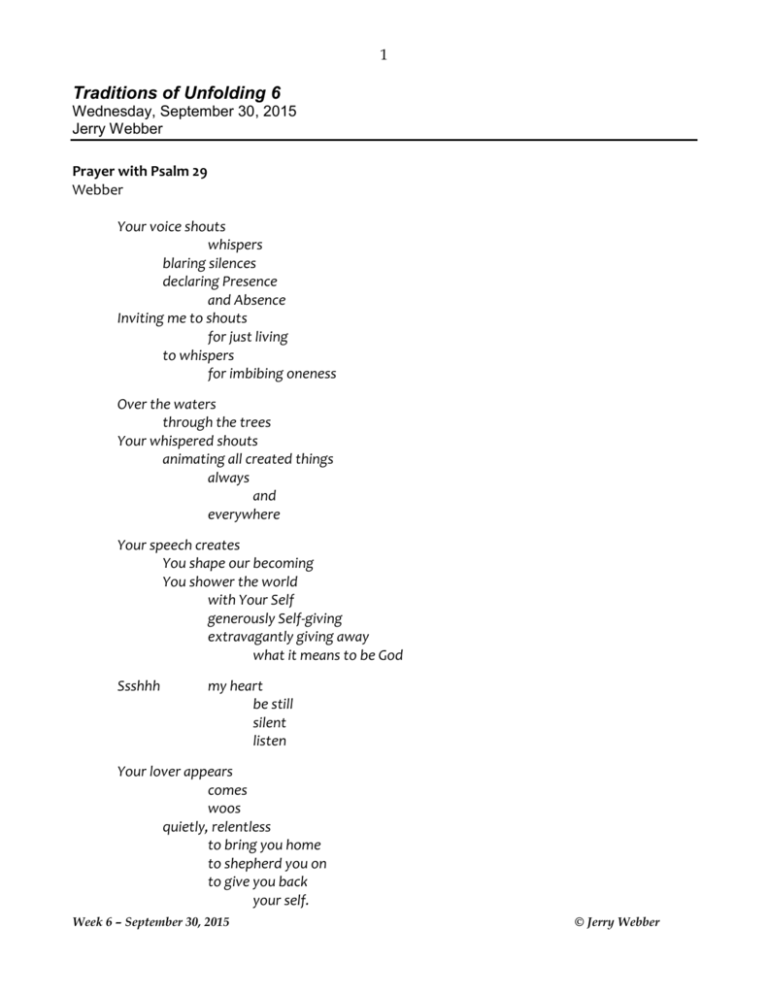
1 Traditions of Unfolding 6 Wednesday, September 30, 2015 Jerry Webber Prayer with Psalm 29 Webber Your voice shouts whispers blaring silences declaring Presence and Absence Inviting me to shouts for just living to whispers for imbibing oneness Over the waters through the trees Your whispered shouts animating all created things always and everywhere Your speech creates You shape our becoming You shower the world with Your Self generously Self-giving extravagantly giving away what it means to be God Ssshhh my heart be still silent listen Your lover appears comes woos quietly, relentless to bring you home to shepherd you on to give you back your self. Week 6 – September 30, 2015 © Jerry Webber 2 Ask Me William Stafford Some time when the river is ice ask me mistakes I have made. Ask me whether what I have done is my life. Others have come in their slow way into my thought, and some have tried to help or to hurt: ask me what difference their strongest love or hate has made. I will listen to what you say. You and I can turn and look at the silent river and wait. We know the current is there, hidden; and there are comings and goings from miles away that hold the stillness exactly before us. What the river says, that is what I say. [William Stafford, The Way It Is: New & Selected Poems, (St. Paul, MN: Graywolf Press, 1998), 56.] Worth Remembering “The soul is the patient part of us.” (James Hillman) “Waiting patiently in expectation is the foundation of the spiritual life.” (Simone Weil) “The shell must be cracked apart if what is in it is to come out, for it you want the kernel, you must break the shell.” (Meister Eckhart) “Conversion is a continuous and lifelong process. Conversions proceed layer by layer, relationship by relationship, here a little, there a little – until the whole personality, intellect, feeling, and will have been recreated by God.” (John Westerhoff) “When order crumbles, mystery rises.” (John Shea) A Practical Unfolding of the Spiritual Journey Last week we introduced material on faith development, or the movement of the spiritual journey, or the unfolding of the spiritual life as it seems to take place from a sociological perspective. We talked about the first three movements in this model, before running out of time. Week 6 – September 30, 2015 © Jerry Webber 3 Today we’ll briefly review the first movements, and then continue through the final four movements. 1. Beginnings: Conscious Openings. God dwells within every human being, as the core or the center of who we are. The image of God, the God-seed, the immortal diamond . . . however you would like to think of this Presence with us . . . this is the stage where we become aware that we embody God in the world . . . either as an evangelical “conversion” experience or a much quieter, dawning awareness that God dwells within. 2. Gathering and Belonging. This is a stage of learning, gathering knowledge through study and association with other persons. Often this learning comes from a gifted or charismatic teacher to whom one is attracted. And this gathering of knowledge comes in the company of other persons; thus, a natural affinity to particular identity groups is formed: “These are MY people!” In this stage, it feels good to learn and belong. It feels good to have solid answers to our questions about life. We don’t question those answers, we simply adopt them as the way it is. And it is comforting to hold those answers in the company of others who believe as we do. While we are not particularly reflective or critical in our learning, we do absorb much material. Sometimes we mistake going to a new study or gatherings new information for growth in this stage. While we may expand our knowing or our learning, we are not actually going deeper; rather, we are simply learning new things at the same stage of development. 3. Serving, Leading, and Giving. Those who persevere stage 2 may at some point be invited into a role of leadership . . . teaching, heading the committee, leading the service project or mission trip. This stage is about doing, producing, and activity. Basically, at this stage a person is being asked to give away to others what they have been given in stage 2. Those who give and serve at this level can get stuck for a very long time. Most of the Western Church has lifted this stage up as the pinnacle of the Christian life, and has not acknowledged anything of the spiritual life beyond the giving, serving, and leading of stage 3. Those who get stuck here often burn out in this stage. Their lives are so continuously in “giving-mode” that they have no source of internal renewal and replenishment. They give until they have nothing left to give, then they may drop out . . . or leave for another church, where they can slide back into a stage 2 role. The Wall. The Wall is some kind of life-event – often a crisis or major challenge – that puts us in a place beyond the resources we’ve gathered to this point on our journey. The Wall cannot be dealt with by the resources we’ve gathered in stages 1, 2, and 3. When folks hit a wall, almost always they default to working harder, to exerting more energy. But hyper-busyness does not negotiate the wall. In fact, people experience much stress as they find that their usual resources no longer work; thus, they feel that they have “lost God” or “lost their faith” or “lost their ability to pray.” Old certainties disappear. The values and beliefs that we thought were trustworthy no longer work. At the Wall, we are invited to let go of our old certainties – the things we were told are true – in order to find who WE truly are and what WE truly believe, apart from what others tell us we should Week 6 – September 30, 2015 © Jerry Webber 4 believe. So the Wall invites an inner journey, a journey that asks more questions, a journey in which new forms of prayer take shape within a person, a journey toward wholeness that would not have come apart from the difficulties of the Wall. In fact, our excessive busy-ness at the wall is often a diversion, a distraction, from the much more subtle invitations in the wall to slow down, to be still, to pay attention, to give ourselves to what Alan Jones calls “the still journey.” Poor Alice in Through the Looking Glass has to run furiously in order to stay in the same place. We, on the other hand, have to learn to stand still in order to continue our journey. We must stand still. . . . The more we run around, the more we lose touch with ourselves, the less of us there is. . . . The still journey of the soul takes forever. 1 It may be more helpful to think of this experience not so much as a Wall, but as a liminal space, that is, a threshold experience that invites us into a new stance toward life, new ways of being with God, self, others, and the world, and new ways of doing our work in the world. A threshold suggests transition. While the image of a “wall” may be helpful for thinking of a challenge that we face, the experience may be more like a threshold experience in which we transition to another season or way of being. You may think of this movement using Carl Jung’s stages of life. Jung believed there were two major seasons of life: The first half of life he called the “morning,” in which the person establishes his or her identity in the world, builds a world of relationships, and finds her orientation in the world by developing the ego. (In the framework we are describing, Jung’s morning of the soul would represent stages 1, 2, and 3.) The second half, or what Jung called the “afternoon,” is for accessing the interior life by developing the True Self, what we are describing in this model as stages 4, 5, and 6. The transition from morning (1, 2, 3) to afternoon (4, 5, 6) comes through what Jung described as a mid-life crisis (a Wall or threshold experience). He believed that “every midlife crisis is a spiritual crisis, that we are called to die to the old self (ego), the fruit of the first half of life and liberate the new man or woman within us.” Wholly unprepared, they embark upon the second half of life. Or are there perhaps colleges for forty-year-olds which prepare them for their coming life and its demands as the ordinary colleges introduce our young people to a knowledge of the world and of life? No, there are none. Thoroughly unprepared we take the step into the afternoon of life; worse still, we take this step with the false presupposition that our truths and ideas will serve as hitherto. But we cannot live the afternoon of life according to the programme of life’s morning – for what was great in the 1Alan Jones, Journey into Christ (San Francisco: Harper & Row, 1977), 52; quoted in Sue Monk Kidd, When the Heart Waits: Spiritual Direction for Life’s Sacred Questions (New York:HarperSanFrancisco, 1990), 33. Week 6 – September 30, 2015 © Jerry Webber 5 morning will be little at evening, and what in the morning was true will at evening have become a lie.2 The transition from morning (1, 2, 3) to afternoon (4, 5, 6) is difficult because it involves a deconstruction, dismantling, or breakdown of our old spiritual and psychological structures, the masks and personas that have been woven so deeply into us that we have not realized they existed. Walls and midlife crises, thresholds and spiritual crises, provide the opportunities to enter the next season of the soul with a deepening awareness of who we are and of our place in the world. 4. Moving toward God and Self: The Inward Journey. The experience of the wall invites us to cultivate spiritual practices that we haven’t needed to this point in the spiritual journey. Thusfar, the journey has been about learning and knowing, belonging and following, leading and serving. We can do most all of those things without ever making an journey inward. Now, facing a challenge that cannot be overcome by the skills and tools we have gathered to ourselves at previous stages on the journey, we must find other more subtle, more interior resources . . . resources like silence and reflection, solitude and meditation, contemplation and open listening. We find ourselves asking more questions and less satisfied with easy, pat answers. At this stage of the spiritual journey, it is almost imperative that a person have some kind of spiritual guide, spiritual director, or soul-friend who has made this part of the journey for themselves, and has experience with the sense of darkness, cloud, and unknowing that are part of this experience. This soul-friend is also one who is able to remind us that all the resources we need for accessing God and navigating through these thresholds are already present within us. We don’t need more of this or more of that. We simply have to access those aspects of our soul-connection with God that to this point have gone untended and have lain dormant within us. 5. Moving toward Others and the World: The Outward Journey. The inner journey is never undertaken for its own sake alone. Some persons, no doubt, are tempted to stall out on the interior journey, seeking their own healing and growth in self-awareness. But the inward journey is always in the service of an outward journey. We move back out into the world of relationships, people, and issues, but with a new grounding, having touched the center – the inner journey of stage 4 – so that we engage the world now from a new stance. Stage 5 is different from stage 3, where we served and led in the world, but from personal motives and for our own gain. In stage 5, we are more aware of our own ego, and our service is less egocentric. In other words, we are serving and giving our lives for others, not so we can gain or profit from the service somehow, but because this is how we want to offer ourselves in the world . . . this is who we are . . . this is our calling, the expression of our vocation – literally, “voice” – in the world. So when we serve in this stage, we do not seek recognition for our service. We do not want to be rewarded for it. In fact, most often, we offer it anonymously, simply because it represents who we are and what we are called to do in the world. In stage 5, persons often contemplate a change in jobs. Or if they don’t 2C. G. Jung, “Stages of Life,” quoted in Sue Monk Kidd, When the Heart Waits: Spiritual Direction for Life’s Sacred Questions (New York:HarperSanFrancisco, 1990), 9. Week 6 – September 30, 2015 © Jerry Webber 6 actually change “paycheck” jobs, they spend their leisure time in very different ways than previously. Sometimes, formal retirement from the work-force presents an opportunity to give time, energy, and resources more intentionally to the causes and situations that stir one to service. 6. The Life of Love. The culmination of this life is simply a life of love, a life which is thoroughly saturated with love for God, self, others, and the created world. Most of us will touch this life of love periodically, but wanting to capture the moment and hold onto it, will lose it. This is not a moment-by-moment “what-would-Jesus-do” kind of deciding how to act or what to do. Rather, it is a life which IS love. Love, mercy, compassion, and generosity become the natural outpouring of this life. We are not willing ourselves to love. We ARE love. Moving on from the Struggle: Jacob’s Story Genesis 32:22 – 32 (CEV) 22-23 Jacob got up in the middle of the night and took his wives, his eleven children, and everything he owned across to the other side of the Jabbok River for safety. 24 Afterwards, Jacob went back and spent the rest of the night alone. A man came and fought with Jacob until just before daybreak. 25 When the man saw that he could not win, he struck Jacob on the hip and threw it out of joint. 26 They kept on wrestling until the man said, “Let go of me! It’s almost daylight.” “You can’t go until you bless me,” Jacob replied. 27 Then the man asked, “What is your name?” “Jacob,” he answered. 28 The man said, “Your name will no longer be Jacob. You have wrestled with God and with men, and you have won. That’s why your name will be Israel.” 29 Jacob said, “Now tell me your name.” “Don’t you know who I am?” he asked. And he blessed Jacob. 30 Jacob said, “I have seen God face to face, and I am still alive.” So he named the place Peniel [Face of God]. 31 The sun was coming up as Jacob was leaving Peniel. He was limping because he had been struck on the hip, 32 and the muscle on his hip joint had been injured. That’s why even today the people of Israel don’t eat the hip muscle of any animal. Week 6 – September 30, 2015 © Jerry Webber 7 Jacob’s entire life and existence has been given to stealth and deception. At birth, emerging from the womb holding his twin brother Esau’s heel, he was given the name “Jacob,” which means “the one who deceives.” Years later, he bought a hungry Esau’s “older-brother-birthright” in exchange for a bowl of stew. And on the deathbed of his father, he fooled weak-eyed Isaac into giving him Esau’s blessing. Jacob literally lived out his life as a deceiver. He spent most of his days on the run from trouble. In Genesis 32, Jacob is preparing to meet his brother, with no guarantees of how that encounter will go. Jacob years back had stolen from Esau that which was most precious to any Hebrew young man. Jacob had every right to expect conflict and struggle. What happens in Genesis 32:22 – 32 stands in the context of this one who is a liar and cheat, who is suspicious and nervous of what lies ahead. It happens in darkness. It happens when Jacob is alone. It takes place at the threshold of a major event in his life. What breaks out is a fight, a struggle, a wrestling match, a two-person brawl. Usually, preaching or teaching on this passage spends time on the identity of the unknown stranger who fights Jacob in the darkness. Is it God? . . . an angel? . . . a demon? . . . Esau? I’m wondering if those questions are diversions and distractions from the real issues at stake here. I’m saying that perhaps it really doesn’t matter who this opposing stranger is, this fighter opposite Jacob . . . whether identified as God, angel, man, demon, or a robber. In the Hebrew narrative, the actual identity is not highlighted, as the reader is not told the identity of this dark stranger. It is as if the story says to us, the identity of Jacob’s opponent is not nearly as important as the fight itself, the struggle itself. The wrestling match is the thing, the fact that Jacob is engaged in struggle that will change him so much that afterwards his name will be changed. And more, it is not so important who you and I believe this fighter is; rather, it is vitally important who Jacob believes he/she is. Whatever the actual identity of the fighter, Jacob connects the struggle with God. Jacob recognizes that God is present in the difficulty. It is as if the struggle itself asks him, “Don’t you know who I am?” to which Jacob responds, “I have seen God face to face and I’m still alive.” He names the place, Peni-el, which means “the Face of God.” He asks for, and receives, God’s blessing. God has been present in this struggle. In the process of the fight, Jacob is wounded. The wound is a mark of the encounter, a sign that he will be forever different because of this fight or struggle. You might think of it as a kind of “soul-mark,” a “memorial-wound” that would remind him of this struggle until his days ended. The final scene of the story takes place at daybreak. Darkness is over. The light of awakening and illumination is dawning. But Jacob – whose name is no longer Deceiver, but now is Israel, that is, “one who wrestles with God” – walks into the sunset with a limp. He hobbles into his future with this limp, but as a changed, unfolding person. Week 6 – September 30, 2015 © Jerry Webber 8 The Man Watching Rainer Maria Rilke I can tell by the way the trees beat, after so many dull days, on my worried windowpanes that a storm is coming, and I hear the far-off fields say things I can’t bear without a friend, I can’t love without a sister. The storm, the shifter of shapes, drives on across the woods and across time, and the world looks as if it had no age: the landscape like a line in the psalm book, is seriousness and weight and eternity. What we choose to fight is so tiny! What fights us is so great! If only we would let ourselves be dominated as things do by some immense storm, we would become strong too, and not need names. When we win it’s with small things, and the triumph itself makes us small. What is extraordinary and eternal does not want to be bent by us. I mean the Angel who appeared to the wrestlers of the Old Testament: when the wrestler’s sinews grew long like metal strings, he felt them under his fingers like chords of deep music. Whoever was beaten by this Angel (who often simply declined the fight) went away proud and strengthened and great from that harsh hand, that kneaded him as if to change his shape. Winning does not tempt that man. This is how he grows: by being defeated, decisively, by constantly greater beings.3 3Selected Poems of Rainer Maria Rilke, trans. by Robert Bly (New York: Harper & Row, Publishers, 1981), 105 – 107. Week 6 – September 30, 2015 © Jerry Webber 9 If the choice were ours, Rilke says, we would spend a lifetime fighting tiny things, things over which we could easily prevail . . . a lifetime of small victories that would confirm our strength and not cause undue stress. But the things, persons, and events that shape us – the way “storms” shape the landscape – are “great” and “immense” and “extraordinary” and “eternal” . . . and they will not be bent by us. Rilke says that winning the struggle does not matter. “Winning does not tempt that person.” In other words, there is nothing for the ego in winning except a larger, stronger, more settled and defended ego. In the landscape of unfolding, where our lives connected to God make a difference in the world, what matters is not winning, but engaging the struggle. The fight itself kneads us “as if to change our shape.” And in the end, our lives unfold in surrender, in losing, in letting go: “by being defeated, decisively, by constantly greater beings.” An Unfolding Life in Meditation I: John 3:16 and Meister Eckhart John 3:16 For God so loved the world that he gave his one and only Son, that whoever believes in him shall not perish but have eternal life. Meister Eckhart I have often said that God is creating the entire universe fully and totally in this present now. Everything God created six-thousand years ago – and even previous to that – as he made the world, God creates now all at once. Now consider this: God is in everything, but God is nowhere as much as he is in the soul. There, where time never enters, where no image shines in, in the innermost and deepest aspect of the soul God creates the whole cosmos. Week 6 – September 30, 2015 © Jerry Webber 10 Everything which God created millions of years ago and everything which will be created by God after millions of years – if the world endures until then – God is creating all that in the innermost and deepest realms of the soul. Everything of the past and everything of the present and everything of the future God creates in the innermost realms of the soul.4 An Unfolding Life in Meditation II: Prayer with Thomas Merton My Lord God, I have no idea where I am going. I do not see the road ahead of me. I cannot know for certain where it will end. Nor do I really know myself, and the fact that I think that I am following your will does not mean that I am actually doing so. But I believe that the desire to please You does, in fact, please You. And I hope I have that desire in all that I am doing. I hope that I will never do anything apart from that desire. And I know that if I do this You will lead me by the right road though I may know nothing about it. Therefore will I trust You always though I may seem to be lost and in the shadow of death. I will not fear, for You are ever with me, and You will never leave me to face my perils alone.5 4Meditations with Meister Eckhart, versions by Matthew Fox, O. P. (Rochester, VT: Bear & Company, 1983), 24 – 25. 5Thomas Merton, Thoughts in Solitude (New York: Farrar, Staus and Giroux, 1956, 1958), 79. Week 6 – September 30, 2015 © Jerry Webber
